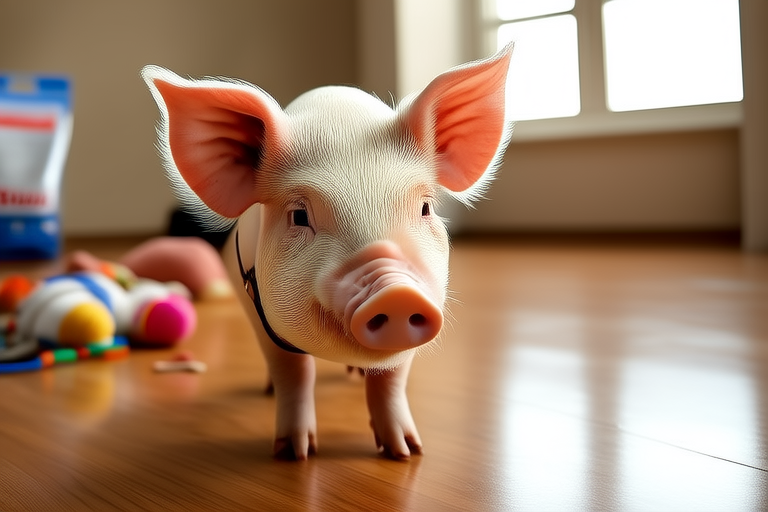The Hidden Costs of Owning a Mini Pig Revealed
Owning a mini pig can be an incredibly rewarding experience, but it’s essential to understand that these animals come with significant financial and emotional commitments. While mini pigs are often perceived as low-maintenance pets, many first-time owners find themselves unprepared for the hidden costs involved. This comprehensive guide will delve into the unexpected expenses and considerations that come with owning a mini pig, ensuring you’re fully informed before making this commitment.
Initial Setup Costs: More Than Just the Pig
The initial setup for a mini pig involves more than just purchasing the animal itself. Let’s break down some of the key costs:
Purchasing the Pig
Mini pigs can range in price depending on their breed, size, and age. Expect to spend anywhere from $300 to over $1,000 for a well-bred mini pig. Prices vary based on factors like breeding lineage and health certifications.
Necessary Housing Modifications
Mini pigs require a safe and comfortable living space. Depending on your current home, you might need to make modifications to accommodate your new pet. This could include building or purchasing a sturdy, weatherproof shelter, installing fencing, and creating a secure area within your home if you plan to keep your pig indoors. These modifications can add up quickly, potentially costing several thousand dollars.
Specialized Diet Requirements
Mini pigs have specific dietary needs that must be met to ensure their health and longevity. High-quality feed formulated for pigs is necessary and can cost upwards of $50 per month, depending on the pig’s size and activity level. Additionally, you’ll need to invest in a variety of fresh vegetables, fruits, and other supplements that are part of a balanced diet. This can increase your monthly grocery bill by $100 or more.
Ongoing Expenses: Veterinary Care, Grooming, and Training
Owning a mini pig is not a one-time investment; there are ongoing costs that prospective owners should be aware of:
Veterinary Care Tailored for Pigs
Veterinary care for pigs can be expensive, especially since not all veterinarians are experienced in treating pigs. Regular check-ups, vaccinations, and preventive treatments like heartworm medication are necessary and can cost several hundred dollars annually. Emergency care, which can be unpredictable, can reach into the thousands.
Unique Grooming Needs
Mini pigs require regular grooming, including nail trimming, ear cleaning, and skin maintenance. While some owners choose to handle this themselves, others opt for professional services, which can add an additional $50-$100 per month to your budget. It’s also important to note that pigs can develop skin conditions that require specialized care, further increasing costs.
Potential Training Costs
Training a mini pig can be both challenging and rewarding. Professional training services can be pricey, ranging from $50 to $100 per hour. Alternatively, purchasing books, online courses, and attending workshops can provide valuable knowledge at a lower cost. However, the time commitment to training your pig yourself can be substantial.
Legal Aspects: Local Regulations and Zoning Laws
Before bringing a mini pig home, it’s crucial to understand the legal implications of ownership. Many cities and towns have strict regulations regarding exotic pets, and mini pigs are often classified as such. Here are some key points to consider:
Zoning Laws
Check with your local government to determine whether keeping a mini pig is allowed under your zoning laws. Some areas prohibit exotic pets altogether, while others may require permits or inspections. Violations can result in hefty fines or even confiscation of your pet.
Local Regulations
Some regions impose specific rules about the size of enclosures, the type of fencing required, and the amount of outdoor space a pig must have. Familiarize yourself with these regulations to avoid any legal issues.
Emotional and Time Commitments
While financial considerations are important, it’s equally vital to evaluate the emotional and time commitments involved in owning a mini pig:
Emotional Commitment
Mini pigs form strong bonds with their human families and can become quite attached. They require companionship and mental stimulation, much like dogs. The emotional connection can be deeply fulfilling, but it also means you’ll need to be prepared for the grief of losing a beloved pet, as pigs typically live 10-15 years.
Time Commitment
Caring for a mini pig demands a significant time investment. In addition to feeding and exercising your pig, you’ll need to spend time grooming them, training them, and ensuring they have adequate social interaction. This can be particularly challenging for those with busy schedules or who work long hours.
Conclusion: Weighing the Benefits Against the Costs
Owning a mini pig is a major decision that comes with both financial and emotional responsibilities. By understanding the initial setup costs, ongoing expenses, legal considerations, and time commitments involved, you can make an informed choice about whether a mini pig is the right pet for you.
If you’re prepared for the challenges and excited about the rewards, a mini pig can bring joy, companionship, and countless memories to your household. However, it’s crucial to approach this decision with realistic expectations and a thorough understanding of what it entails.
